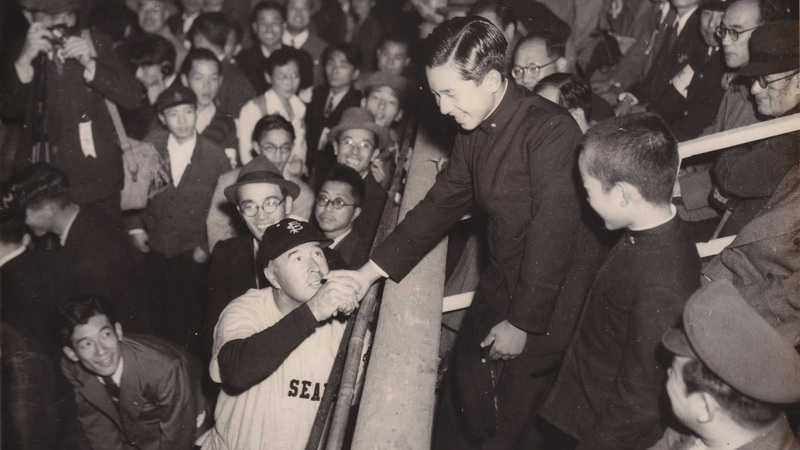
A Shared Pastime Softening Hard Politics
Diamond Diplomacy
MOVIE REVIEW
Diamond Diplomacy
-
Genre: Documentary, History, Sports
Year Released: 2025
Runtime: 1h 26m
Director(s): Yuriko Gamo Romer
Where to Watch: shown at the 2025 Mill Valley Film Festival and Newport Beach Film Festival
RAVING REVIEW: This documentary manages to take something as familiar as baseball and remind us how much weight it can carry beyond the confines of a field. DIAMOND DIPLOMACY is one of those rare films that doesn’t just tell the story of a sport, but instead reshapes how we understand its place in the world. In under ninety minutes, it captures more than 150 years of history between the United States and Japan, demonstrating how the game became a vessel for unity, resilience, and repair.
Director Yuriko Gamo Romer approaches this story with a steady hand, making clear from the opening that this is about far more than batting averages and highlight reels. The choice to anchor the narrative through the personal stories of Masanori “Mashi” Murakami, the first Japanese player to reach Major League Baseball, and Warren Cromartie, the American slugger who made his mark in Japan, gives the documentary its heart. Their experiences are personal and political, reflecting how the game has always been bigger than the scoreboard.
From the introduction of baseball in Japan during the Meiji period in the late 19th century, Romer traces a timeline that spans moments of cultural exchange, wartime fractures, and eventual reconciliation. Archival footage and never-before-seen home movies from the 1949 San Francisco Seals goodwill tour bring the past to life, making it feel relatable and accessible. We see Babe Ruth, Joe DiMaggio, and Lefty O’Doul not just as athletes but as unintentional ambassadors whose charisma and goodwill softened hard edges during fraught decades. The film’s structure makes it easy to follow this lineage into the modern era, where figures like Hideo Nomo, Ichiro Suzuki, and Shohei Ohtani embody the living continuation of that bond.
The greatest strength of DIAMOND DIPLOMACY lies in its ability to present sports as a language that transcends borders. When Japan banned most things American during World War II, the people refused to let baseball disappear—they simply stripped away the English words. That detail, both small and immense, says more about cultural resilience than any political speech could. By the time Lefty O’Doul returned to Japan with the Seals in 1949, the country embraced baseball as a symbol of renewal. The documentary captures these turning points without overdramatizing, letting the images and testimonies carry the emotional weight.
Romer’s background as both Japanese and American allows her to walk a fine line that other filmmakers might mishandle. She doesn’t shy away from the uglier moments—racism, incarceration, propaganda—but she frames them within the broader arc of perseverance. Instead of leaning into despair, the film emphasizes connection, whether through youth clinics where Murakami mentors the next generation or commemorative games that bring together players and fans from both countries. These sequences avoid sentimentality by grounding themselves in lived experience.
The ambition to cover a century and a half of history occasionally leaves transitions feeling abrupt. Some sections breeze past events that could have benefited from more context. The talking-head interviews, while informative, sometimes overstay their welcome, creating brief lulls in momentum. This could have benefited from being a limited series, but I understand that the story itself is the important part.
What saves the film from dragging is its return to the human story. Cromartie reflecting on his time in Japan, Murakami recalling the culture shock of San Francisco, and even archival clips of Julia Ruth Stevens speaking about her father’s legendary goodwill tour—all of these elements rehumanize the narrative when it risks becoming too dense.
In terms of relevance, the documentary couldn’t have arrived at a more timely moment. As nationalism rises and divisions deepen worldwide, the reminder that something as simple as a game can build bridges feels timely. Ohtani’s global superstardom, Ichiro’s Hall of Fame legacy, and even Nomo’s pioneering role all serve as contemporary touchpoints that make the past feel like a living continuum.
The closing moments bring the narrative full circle, demonstrating how the connections forged long ago continue to ripple through the present. By tying Murakami and Cromartie’s experiences to the broader history, Romer ensures the story feels personal and global at once. The final impression is one of gratitude—not just for baseball, but for its role in preserving understanding when other avenues faltered. The impact it delivers is undeniable. The film reminds us that diplomacy isn’t always found in boardrooms or treaties. Sometimes, it’s found in a pitch, a swing, and the simple act of two nations cheering together.
Please visit https://linktr.ee/overlyhonestr for more reviews.
You can follow me on Letterboxd, Instagram, Twitter, and YouTube. My social media accounts can also be found on most platforms by searching for 'Overly Honest Reviews'.
I’m always happy to hear from my readers; please don't hesitate to say hello or send me any questions about movies.
[photo courtesy of THE NATIONAL ENDOWMENT FOR THE HUMANITIES, A FLYING CARP PRODUCTION]
DISCLAIMER:
At Overly Honest Movie Reviews, we value honesty and transparency. Occasionally, we receive complimentary items for review, including DVDs, Blu-rays, CDs, Vinyl Records, Books, and more. We assure you that these arrangements do not influence our reviews, as we are committed to providing unbiased and sincere evaluations. We aim to help you make informed entertainment choices regardless of our relationship with distributors or producers.
Amazon Affiliate Links:
Additionally, this site contains Amazon affiliate links. If you purchase through these links, we may receive a commission. This affiliate arrangement does not affect our commitment to honest reviews and helps support our site. We appreciate your trust and support in navigating these links.